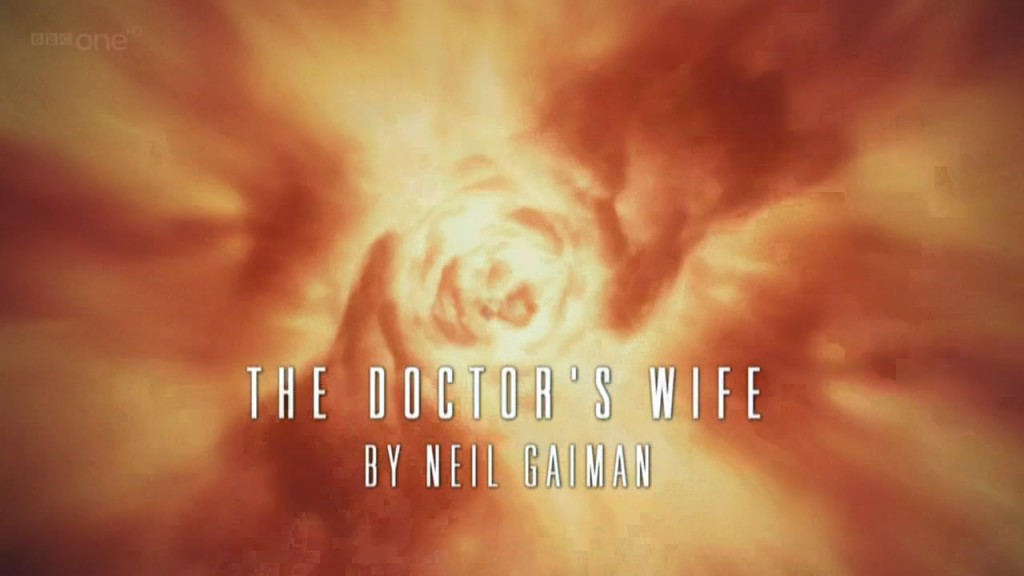
Spike: Dissent, it’s not something I’m used to. Generally speaking I like things; I see the best in things. I try and not focus on the niggles, but find the stuff to admire. Now I know that objectively this is a great, great, episode of Doctor Who and I know that my Tag Team compatriots are well aboard the love train, but something just felt ‘off’ to me. Maybe I had too many expectations, Doctor Who is a property I’m kind of scarily attached too, and Neil Gaiman is one of my favourite active authors. I think the probably is that the episode was merely great, when I guess I was expecting transcendence. And typing that out I realise how massively, insanely, unfair that is.
So, let’s focus on the positives. As someone who grew up with omnibuses of Classic Doctor Who every Sunday morning the episode was a cavalcade of nostalgic joy. Essentially this was a love letter to Classic Doctor Who, with references to the old mythology abound and some fantastically nostalgic set design. I kind of loved the generic corridor that Amy and Rory found themselves trapped in, largely because it was an almost exact replica of EVERY corridor the past Doctors had ran down.
I think more than anything else I was kind of disappointed at the relatively small scope of the episode, like the entire episode was the epilogue to a far grander, far wider reaching, story. More than anything else I found myself a little disappointed by Surrane Jones as Idris, maybe it was the visual design or the fact that the character didn’t really feel like she had time to breath. This is an episode full of greatness, from the wonderful visual design to an all-time best performance from Matt Smith, but on my initial viewing I was left wanting, something…more.
I’m assuming that the gang are going to have strong, harsh, pointy, words to say in the episodes defence, so have at it.
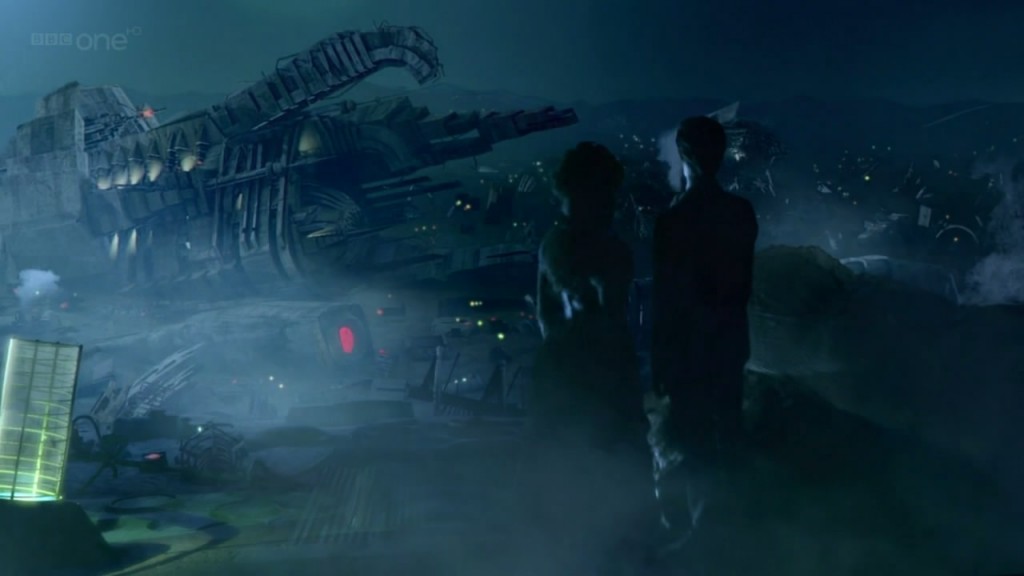
Ian Pratt: I can think of a few positive things to say about the episode, but none of them are harsh or pointy (I prefer to keep those for the comments section.) This was a massive step up from last week’s admittedly fine but unremarkable tale of swashbuckling chicanery. The story was pretty straightforward and largely eschewed the motor-mouthed techno-babble that occasionally makes some of Moffat’s episodes feel like Gilmore Girls meets Star Trek (and I say that as a fan of both properties who would watch the pants off that crossover.) As a result, I actually felt like I had the chance to really drink in character and background details in a way I haven’t so far this season. My main nit-pick with Moffat’s work is that it all feels a little too overzealous and urgent, hurtling toward a rapid-fire finish without leaving space for a breath. Beats were left here, leading to some wonderful dramatic payoffs.
Amy and Rory’s mini-purgatory in the darkened corridors of the TARDIS was delightful. It reminded me of that bit from Galaxy Quest with the impractically designed ship’s sections… but played like a horror movie instead of a comedy. What’s not to love about that? And although I’m firmly of the mind that no Junkyard Planet is complete without a transforming Eric Idle, the production design in this episode was so outstanding I’m willing to overlook that. Aside from the gorgeous details like the steam-punk “patchwork people” and the TARDIS scrapheap reminiscent of Moebius and Giger, The Doctor’s banter with Idris was what really put this over the top for me. Jones took a little while to settle into the role, but once the significance of the episode’s title became apparent, Matt Smith’s charisma whirlpool pulled her in and the whole thing just took off from there.
Adam: Here’s the thing. I’m the guy who casts a jaundiced eye towards Who, but I’m a huge, raving Neil Gaiman fan. So if anything was getting me excited, it was Gaiman’s involvement, but at the same time it was Doctor Who, a franchise to which I’m a relative Johnny-Come-Lately. And this was an episode very strongly geared towards long-time fans, which was never going to resonate as strongly for me. I can appreciate the long, epic history of Who, and I do get a bit of an intellectual charge reading the explanations for the many little details that Gaiman threw in there. But the central relationship, the idea of the TARDIS as “the Doctor’s Wife”, was something that seemed more “cute” than emotionally wrenching to me. I just don’t have the history with the show. The Amy-Rory stuff actually had more of an impact for me.
Which is not to sound too critical. It was a very, very good episode as far as I’m concerned. Actually, it’s possible that I enjoyed it more because I have a bit of distance from Doctor Who and thus didn’t have the immense weight of expectation hanging over it. Ian’s right, the pacing was well-handled (though I personally like the rapid-fire pace of Moffat’s episodes, as long as he doesn’t lose control of the plot) and Gaiman brings some actual character insight, something that I think the show often has trouble with.
Ian: Great point, Adam. I loved getting a chance to see more of the Doctor’s slightly darker side that I’m still largely unfamiliar with as a Johnny Come Really Really Lately to Doctor Who. We definitely seem to have connected more with this episode overall as the least “attached” to the show. I also think you summed up my feelings towards Moffat’s problems perfectly. When the words per minute counter shoots to the sky, my eyes start to roll a bit almost involuntarily because it feels someone papering over cracks. It doesn’t usually prove critical for the episodes as there are so many strong ingredients that something is bound to hit. All the same, one or two more episodes could do without the saturation of ideas. In a sense, this episode made good on last week’s promise of delivering a simpler story (though larger in scope) with room to maneuver. The cast responded in kind; even though I should probably just go ahead and buy the domain “darvillfan.org”, I did quite love Gaiman’s slightly emasculating take on Rory.
Adam: An emasculating take on Rory? UNHEARD OF!!!!
Spike: It also gave us Rory’s FIFTH death. I’m tempted to make a bar chart, because I’m pretty sure Moffat and co. have killed off most of the main cast three or four times each now.
Ian: Is it fair to assume that Rory has his own specially coloured “Death” pages in the scripts? “Feel free to grab a sandwich, Ken- err, Arthur. You’re about to take an early bath.”
Spike: Hey, look at that. I quickly made a bar-chart.
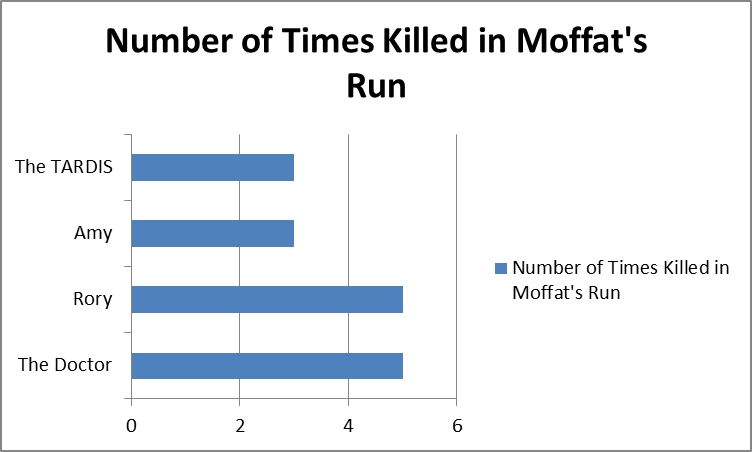
At the moment it seems like Rory and The Doctor are neck and neck, although Rory has now been killed in literally half the episodes he has appeared in.
Ian: No wonder I like Moffat’s run so much; that’s a level of widespread mortality (and resurrections) rarely seen outside of comics. Random aside: the special effects here were so far beyond the last 3 episodes it was incredible.
What can you show me in a Rory Emasculation Barometer, Spike?
Spike: BY THE POWER OF EXCEL!

Ian: Outstanding barely covers it. Thank you, sir!
Spike: I know the production values for this were significantly raised, and that the episode actually came in at around 1 hour before they started to edit it down. I think they threw a lot of money at the episode because they knew Gaiman would be a draw, part of me thinks it being shuffled to the fourth, rather than third, slot was to compensate for any potential slump caused by ‘Curse of the Black Spot’.
Kristina: I can honestly say without a bit of exaggeration that this was my favourite episode of Doctor Who ever. I don’t think I’ll even be able to properly express just how impressed I was with this one, from the production value, to the cracking script, and the magnificent performances by Matt Smith and Suranne Jones. There are very few shows on TV that can have me withdrawing from the screen in dread, only to be in tears a few minutes later, and ultimately cheering for joy by the final shot. Good Lord, this was BRILLIANT. And after watching it again, I am honestly blown away by just how good Suranne is in this episode. Honestly, how do you portray the TARDIS?! But she pulled it off in spades. Simply phenomenal work here.
Ben: Can definitely count me in with those who loved the episode, but it felt like more of a love-letter to the show than a standalone story. Gaiman’s greatest strength as a writer generally has always been taking existing ideas and putting new spins on them, or playing with archetypes, and he put both to excellent use here, but the ingenious take he puts on the Doctor/TARDIS relationship is one that needs a certain amount of viewer investment in the show to work.
On a similar note, this probably takes the prize for most classic series references in a new series episode. We’ve got telepathic box messages (‘The War Games’), jettisoning TARDIS rooms for energy (‘Castrovalva’), tiny pocket universes (The E-Space stories), the Eye of Orion (‘The Five Doctors’), standalone console (‘Inferno’) and so on. Gaiman’s a long-time fan of the program, and this heavily shows.
Other than the continuity aspects, though, this was a fantastic story. The junk planet and its occupants were some of the most distinctive visual design we’ve seen on the show, and although Aunty, Uncle and House were very typical Gaiman characters, they still worked- creepy and oddly sympathetic all at once.
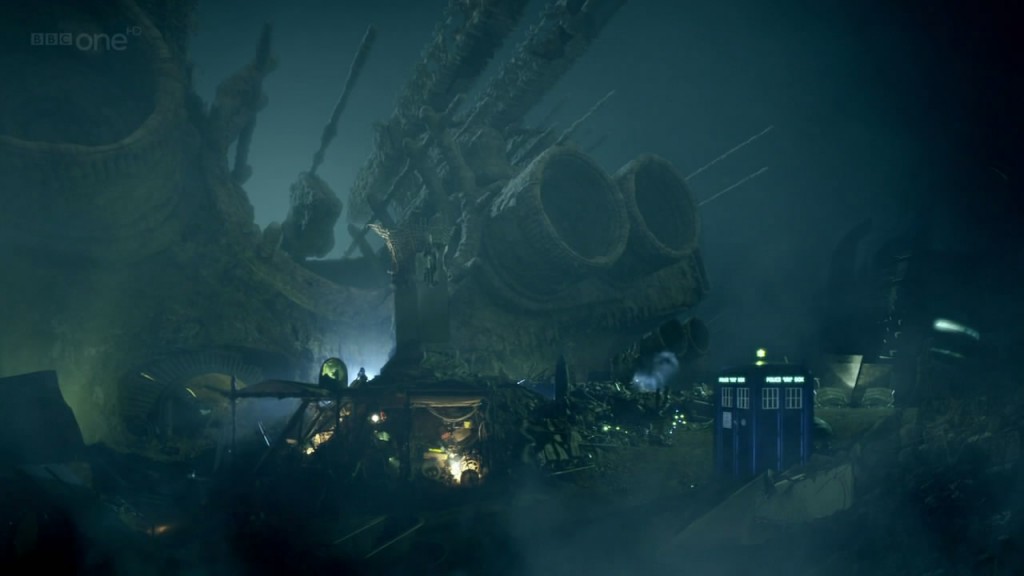
Adam: See, now the contrarian in me wants to pop out and agree with Spike. I think this was really good, I’m prepared to accept “brilliant” even, but I think its brilliance depends heavily on its reliance on existing Doctor Who mythology. I still prefer ‘Blink’ (and for all my criticisms of this show, ‘Blink’ is probably the best single episode of any genre TV show in the last decade or more) because its brilliance is quite apart from being an episode of Doctor Who. ‘The Doctor’s Wife’ seems to be on a bit of a sliding scale that depends on how you feel about Doctor Who. That’s not a huge criticism per se, but I can’t join the people who teared up watching it. The emotional power comes from decades of Who fandom, not the episode itself–which, actually, is something I’ve had issues with throughout the run of Nu-Who. Too many episodes (especially of the Russell T. Davies run) are about how great it is to have Doctor Who back and how awesome the show is. Of course, this was much, much better than that, and even a relative newbie could understand the relationship between the Doctor and the TARDIS. And I felt it, too. It just didn’t have the immense weight behind it might have had for some.
Kristina: I actually loved that the emotional power came from the history behind the show. It felt like the whole episode was a love letter, not just to the show itself, but to the fans that have followed it for years. Some key questions that have floated through the fandom for years were answered here. Can a Time Lord change gender during regeneration? Yes! Just how sentient is the TARDIS? Very! For someone who is a newbie, the relationship is clear, but for someone who has been watching for a while, this episode plays like gangbusters. I’ve seen all of Nu-Who and have been going back to watch the older Doctors as well, and I’ve always wondered just how much the TARDIS understands, or if she really is a female. The episode answered those questions in a manner that was so clever and fun that I couldn’t believe that it hadn’t been done before. And in regards to why I cried at their final conversation, I think that it was a combination of knowing the great affection that The Doctor has for her and seeing his reaction to the possibility of finding the Time Lords. At the end of the day, he just desperately yearns for companionship, for someone to talk to, and losing the hope for redemption with the Time Lords along with losing a chance to connect vocally with what is essentially the last living piece of his home world was too much to bear.
Also, Matt’s performance during that scene is heart-breaking. I’ve never seen his Doctor look so pitiful and sad. The shot of him holding his hands to his chest, seemingly as both of his hearts break inside, had me crying right along with him.
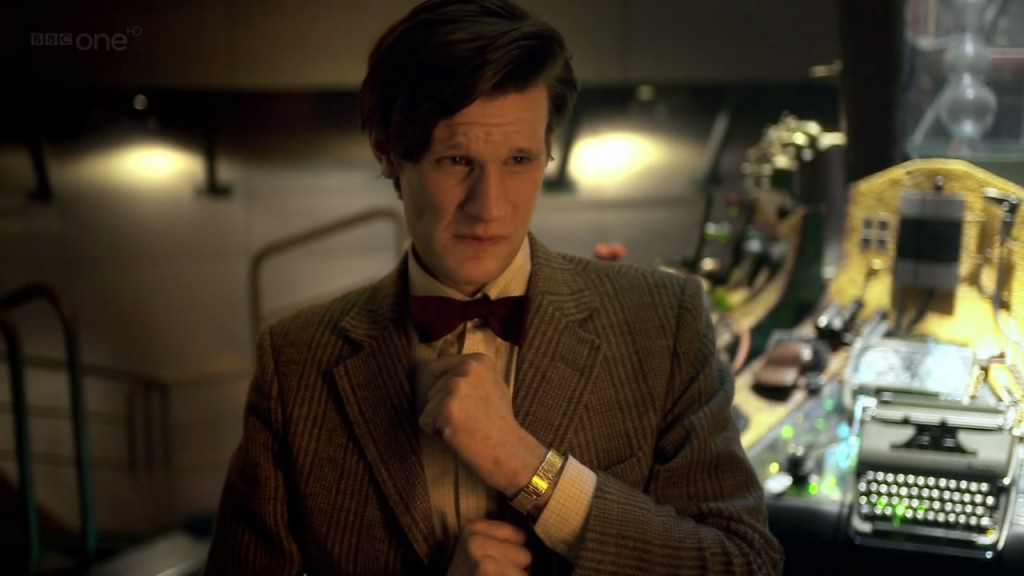
Adam: Hey, you’re making me feel bad! I hasten to point out that my comments aren’t really a criticism, just an observation. There’s nothing wrong with an episode for the hard-core fans, and I’m gratified to hear that it worked so well.
Let’s focus on another emotional beat that I had a little more invested in. A few weeks ago, I said there needed to be an episode where Amy realized how badly she treated Rory. And lo and behold, I think she got that in this episode. I think Gaiman is one of the best writers out there for grounding the fantastical in character, and the Rory/Amy scenes reflected that beautifully.
Kristina: I did love that Amy got a bit of…I’m not sure if comeuppance is the proper word, but it was nice to make her confront what I’m sure Rory has felt at one time or another. Not necessarily the “I hate Amy” graffiti, but the older version of Rory venting his frustrations about being made to wait felt very authentic. It may have been House messing with her mind, but she still needs to stop treating him like crap.
Ben: I think Karen Gillan has been growing as an actress these last few episodes- she’s investing a lot more confidence in the character, and those emotional scenes, I think rang truer than some of hers last year.
As for the TARDIS being sentient, it’s been strongly leaned towards before (the generally dreadful 1996 TV movie, the climax of Eccleston’s season), but Gaiman has pulled off a pretty tricky retcon, and I’m impressed he managed to do it without warping or clashing with the tone of stories we’ve already seen.
Also, the thing about pulling/pushing the door was amazingly simple, but very effective, and representative of the kind of attention to detail that was on display in every aspect of the episode.
Casey Moore: I thought this was a pretty great and wonderful episode filled with all the old Doctor Who ways of fun, sadness, scares, and wonder. And really, it was reminded me much more of old Doctor Who which used to come on late night on PBS here, right down to the wobbly TARDIS special effect at the end.
Funny thing is, I might be the one who loves this the best, but my Doctor Who love is still rather new. I only came on board with the 9th Doctor, so the last few years I have been playing catch up, and really, it has been Smith’s run that has me completely energized by the franchise. And this episode really does bring back so much of what I have seen and remember of those old ones.
This was also probably one of the most quotable episodes of Doctor Who I have seen. Really you could rip a lot of the lines from the Doctor and Idris/TARDIS/Sexy and use them over and over again.
Someone elsewhere said this might become one of those shows which effects a lot more of Doctor Who from here on out. I think that is right. Just as they have the Doctor now snapping his finger and opening up the TARDIS, I can see them now working in more ways for the TARDIS to “talk” to the Doctor, either through its moving of levers to where it lands and why.
The only thing I would have liked to have seen would have been more of Rory’s point of view in those corridors. Was he being made to suffer similar horrors and just more able to deal with them because of his 2,000 years of memories? Or is it because he is becoming surer that somehow it is going to be fixed.
One big thing about this episode, it makes me wish they would go outside for more Who writers. By now it’s clear there are plenty of talented writers who are fans and might also make great television. And maybe we can avoid less of the Pirate episode, and more like this.
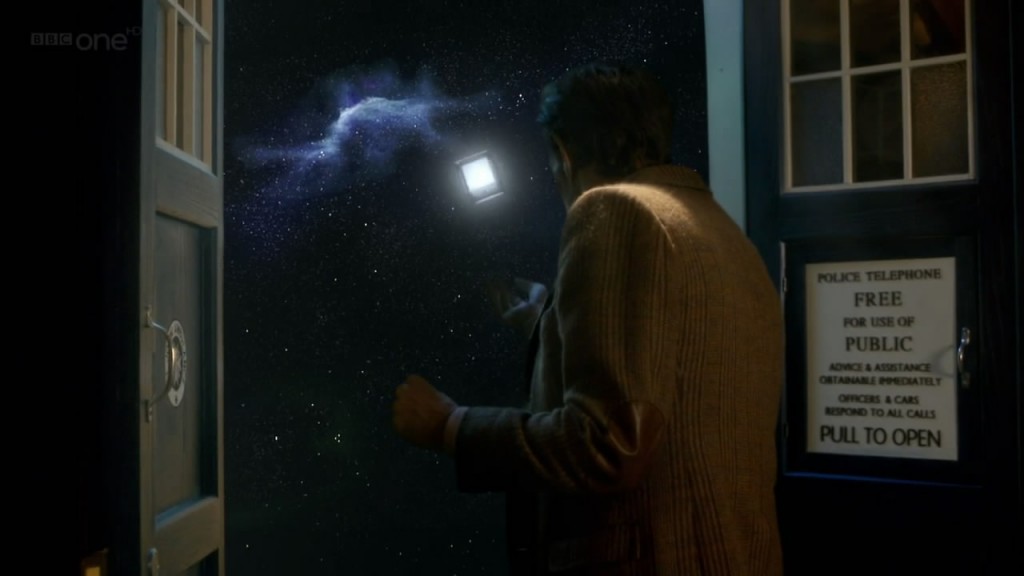
Ian: I had a really similar thought about the writing team just before the end of the episode, Casey. I realize there’s a budget to think about and people have conflicting work schedules and so on, but if the results were consistently up to this level, I’d be up for a couple of “boutique” episodes penned by “outside” scribes every season. It should be obvious by this point that Richard Curtis’ ‘Vincent and the Doctor’ is one of my favourites.
Casey Moore: Really, I think Warren Ellis and Grant Morrison would jump at the chance. Morrison has already done a Doctor Who comic story. I am not even a huge Morrison fan, but I am pretty sure he could bring in a great episode. There are others I am sure they could find in film and books who might want to take a shot.
Ben: I’m still regretting the absence of that Stephen Fry script they bought a few years back. And agreed with Casey- this was an incredibly quotable episode. Biting “like kissing, but with a winner!” and all.
Spike: I’ve just been getting into the Hellboy comics, and it occurs to me that a comic book writer like Mike Mignola would possibly be an amazing fit for the show. I think Doctor Who is a show that benefits from having different creative styles. Going back to what I said a few weeks back I think what made the Tom Baker run so special was the heavy sci-fi influences from Douglas Adams and the horror elements from Hinchcliffe. Doctor Who needs those bits of ‘flavour’ to work, in my opinion.
Adam: Don’t forget Paul Cornell wrote ‘Father’s Day’ from Season 1. And Mark Gatiss wrote a bunch, but maybe he doesn’t count. But yes, having an outsider viewpoint always seems to invigorate the show. From what I understand, it seems like Doctor Who is a bit of a gateway for British SF and fantasy writers–along with 2000 AD, it may be the reason why the UK produces so many great comic book writers. It seems like it’s a more accessible world than here in North America.
Anyone else find it interesting that River Song was sort of an “unstated presence” in this episode? “The river is the only water in the forest” certainly seems like a reference to River’s fate in the ‘Forest of the Dead’. And I’d like to point out that this episode’s title seems like yet another confirmation that River is NOT the Doctor’s Wife. They release the title, everyone goes nuts, and it turns out to be a fake out.
Ian: See… this is why I don’t go in for all this wild speculation business. It’s fun throwing out theories and that, but this show taught me early on that trusting it is about as wise as watching it with the sound all the way down. And just for the record, Casey kind of read my mind with the whole Grant Morrison thing. Watching that unfold before my very eyes was extremely cool/strange. Although one thing I’m sure we can all agree on is Terry Pratchett NOT joining the guest writers’ troupe, am I right?
Adam: Heh heh. Or Stephen Fry. And definitely not Lawrence Miles.
Since this episode brought it up, what do you think about the possibility of other Time Lords out there? I go back and forth on whether having them be mostly extinct is a good thing or not. I’m generally in favour of the Doctor being alone in the Universe–it makes dramatic sense–but I do think there are potential stories to be told about encounters with other (non-Master) Time Lords, and this episode seemed to hint a little at them. Did you notice that the Doctor’s main reason for shuffling Amy and Rory back to the TARDIS to look for the screwdriver wasn’t to keep them safe–he thought it was a “friendly planet” at this point–but to keep them from meeting the other Time Lords? And when Amy called him on that, he quickly changed the subject. Are we headed towards another revelation about the Doctor’s relationship to his own people?
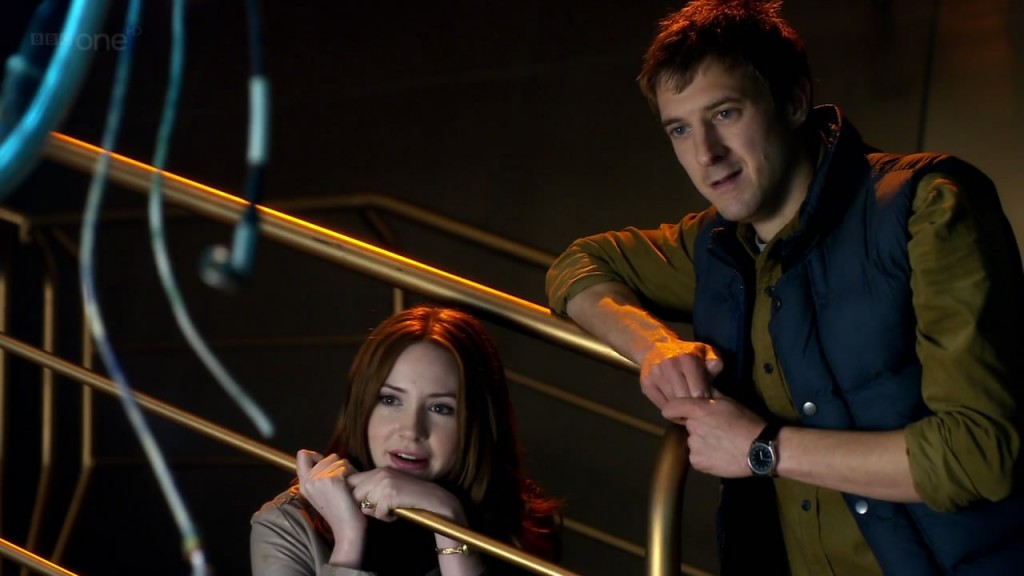
Ian: I’ve still got some way to go before I can drop Who references with the rest of you, but even a newbie like myself can appreciate the potential of an episode where we find out just how much the Doctor might have “embellished” or tweaked his past so as to not freak out/scare off potential companions/have the Space Police called on him. That actually might not be a bad episode for Grant Morrison to write; I wonder how much it could go like The Filth and still get shown at 6PM on a Saturday night?
Ben: I actually kind of miss the Time Lords, but at the same time don’t really want to see them brought back because they’ve been so heavily dramatized in the new series. Part of what made them striking, originally, was that they were an advanced, godlike alien culture who were incredibly dull and pompous and never, ever used their power, and it was that stultifying society that caused the Doctor to rebel rather than anything more melodramatic. Bring them back and I don’t think the writers would be able to resist tying them all into the fate of the universe again.
Spike: I think having new blood in the writers pool always helps. Some of the best Star Trek episodes, from the original series, were written by authors like Harlan Ellison who were more short story writers than TV writers. Similarly stuff like The Wire really benefited from having a core group of crime fiction writers, rather than TV writers. I think this episode had a fantastic feel because it felt largely restrained from the usual conventions of television.
Adam: But by the same token, remember when the X-Files brought in Stephen King and William Gibson? Gibson’s first episode was good, but his other one, and King’s, were both pretty mediocre. But then, that may have had to do with Chris Carter being a raving totalitarian egomaniac who had to rewrite everyone’s scripts.
But I do love that Who is a show that can have guest writers, something a lot of genre shows can’t really pull off these days, with their focus on big arcs. I still think the best shows are the ones that can tell a terrific, self-contained story sometimes AND do long-form arcs for the rest of the season. So sure, more guest writers, I say. I admit I would kill for a Grant Morrison episode. Actually I think Moffat and Morrison have a lot in common with each other–both pack in as many ideas per square inch as possible, to the point where it gets a little overwhelming sometimes.
Spike: I just think that Doctor Who often lives on how different flavours in the mix, it’s why despite being hit or miss I appreciate writers like Mark Gatiss being kept on. I just love that you can hear specific ‘voices’ on an episode by episode basis. Having said that I appreciated how this episode seemed to blend the general style of Gaiman, with more Moffaty sort of banter. Lines like “Biting is like kissing, but with a winner” feels almost like a direct homage to Moffat’s work in Jekyll.
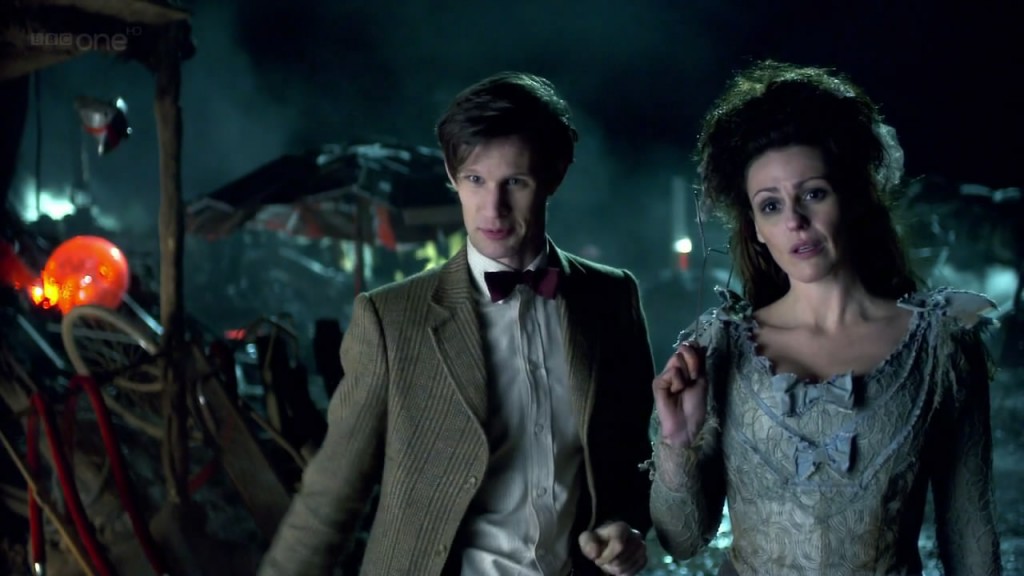
Adam: So, Suranne Jones, aka NotHelenaBonhamCarter, as the TARDIS. For all the great acting in this episode, I thought she was actually a little, teensy bit underwhelming. I heard a few hard-core Who fans complaining that the TARDIS in human form ought to be way more “awesome” (in every sense of the word) than she was, and while again I can’t claim to have a very clear idea of what the TARDIS would be like as a human, I do sort of agree that she just came off as a standard Neil Gaiman quirky Goth girl–Delirium, essentially. I loved the relationship between her and the Doctor, but as a “character” I’m not sure I bought it.
Spike: I felt that the performance was very, very, forced. It was like a bizarre am-dram approximation of quirky. I honestly think the costume did most of the work for her. I actually bought her more ‘normal’ moments with the Doctor rather than her moments of wild-eyed quirkiness. It didn’t help that she was surrounded by actors doing great work. I think this was easily Matt Smith’s best work with the Doctor thus far, just everything from his delight at having mail, to the way he casually told Iris to end House were fantastic work. Even one shot characters like Auntie and Uncle felt a little more alive, I loved Uncle’s “I feel fine” before he died.
Casey Moore: And I loved the performance and got a kick out of it, because to me it seemed like a time machine’s soul would be all over the place. She has no real understanding of what it means to be human or to actually speak and interact with people beside being a machine and dragging them through time and space. Of course I have a thing for that Helena Bonham Carter type, so she was very much up my alley.
I love Matt Smith’s angry Doctor. It is probably one of my favourite performances every time he turns it on. He brings so much menace to it, and in many ways you don’t know exactly what is going to happen: he might wipe out everyone around him, or he might be nice and just go after one bad guy.
Ben: I liked her too. Despite the unfortunate resemblance to both Burton’s favourite actress and Gaiman’s typical heroines, she still came across as an effective machine stuck in human form- a little too heavy on the quirky at first, maybe, but by the time she was arguing with the Doctor through the cage there was real weight to it. Like Matt Smith, she managed to get across a kind of agelessness, the sort of long-perspective calm you’d expect the character to have.
To be honest, I think the outfit may have been most of the problem. Ditch it, and all the Bonham-Carter resemblance falls away.
And yes, this episode was one of Smith’s best performances, showing fantastic range from casually manipulating Amy to the whole gamut of reactions when he finds the cupboard full of boxes.
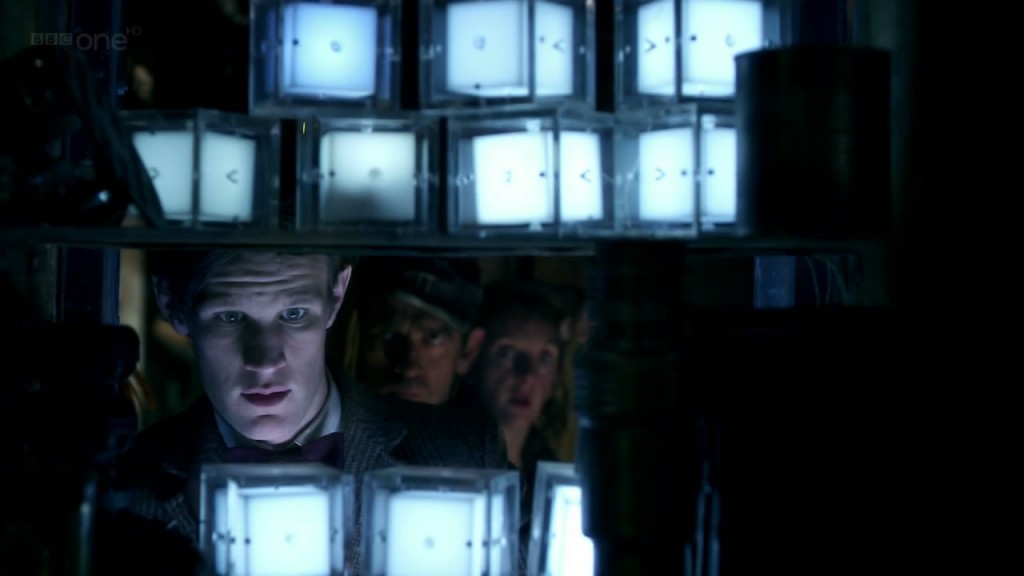
Spike: I think Smith’s strength is that he bottles down his emotions and internalises a lot of stuff. Tennant was the weepy Oncoming Storm; Smith is the kind of Doctor who lets everything bubble below the surface and then act on that broiling, internal, emotion. You can kind of see it when he finds the Time Lord message cubes, the anger slowly simmering away as he realises what has happened.
I think in the final showdown with House, Tennant would have delivered a grand speech before finally delivering the coup-de-grace and feeling very bad about it, that still takes place with Smith but you can see it taking place behind his eyes. I think playing against Smith is what made the ‘forced’ quirkiness of Idris the more apparent.
Ben: Hah, yes, I can just imagine how Ten would have handled that scene.
“You’re such a beautiful, unique mind, House. One of a kind. You could offer so much, so I’m giving you a chance. One chance. I’ll find you a world somewhere where you can feed quietly on rift energy and never harm another TARDIS.”
“No? Then I’m so sorry. I’m so very, very sorry, but this has to be done.”
On another note, aside from the repeated corridors (which is, of course, yet another deliberate gift to the fans), the production design and set design in this episode were exceptional, despite being a quarry half the time, weren’t they? This isn’t the first script that’s been shuffled around for budget reasons, and I’ll readily take a malnourished episode like last week if it gets us something like this as a consequence.
Spike: Even away from the basic set design the episode was just gorgeously directed. There were a ton of shots which actually felt more like a feature film than a publicly funded TV show. They weren’t even flashy shots, but just the composition and the lighting were great. I was thinking of simple stuff like the Doctor right at the end, just doing repairs to the TARDIS and how amazingly framed it was.
Ben: I think, bar a few weak episodes (Last year’s Silurian 2-parter and ‘Vampires of Venice’) the quality of direction has shot up under Moffat generally, but this was unusually good even by those standards.
Spike: Just the use of colour and light, I kind of love the dark colour tones the show has been employing the last couple of seasons. It’s really given Moffat’s run its own, unique, feel.
Adam: It’s interesting, actually, when you see this kind of modern low-budget SF show, they tend to have a certain chintzy look…Farscape being the one that springs to mind. But Doctor Who doesn’t look like that, despite being pretty cheap. It’s got its own, totally unique chintzy look!
Spike: Interestingly the director of this, Richard Clark, worked on two episodes of Who previously. One of them, ‘Gridlock’ I think is one of the best directed of the RTD’s run. Just really well conceptualised and shot. The other is ‘The Lazarus Experiment’ which is one of the worst episodes of New Who from a visual standpoint. It seems like Moffat has developed a pool of directors with very similar visions for Season Six. Toby Haynes directed every episode from ‘The Pandorica Opens’ to ‘Day of the Moon’ and that seems to have set the visual tone for this season.
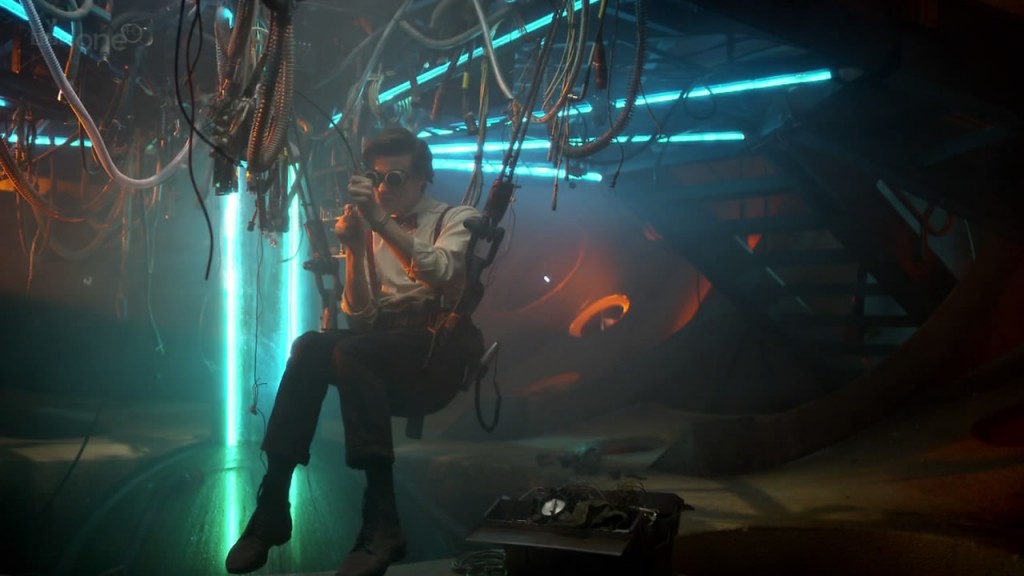
Ben: To be fair to ‘Lazarus Experiment’ (an episode I’ve always been among the few defenders of), it did have a CGI monster that interacted physically with the world around it instead of just sliding across surfaces, which is rare for TV.
I think there’s been a fairly consistent visual tone to this era from the beginning of last year, and that tone’s a fairy-tale one, a sort of Roald Dahl approach that has a real sense of weirdness and wonder to even otherwise underwhelming episodes like last week’s. It’s a big contrast to the more sci-fi look of RTD’s stuff- I think Moffat sees the show as much more fantastical, and Gaiman was obviously a perfect fit for that.
Spike: I think a lot of Sci-Fi shows build sets and outfit their characters and then just shoot like traditional sitcom. It’s why I never got into shows Stargate or the newer Star Treks, they often felt kind of inert and visually boring. Like “Hey, we’ve got some guys in make-up and some vaguely sci-fi mise-en-scene…why try anything else”. I kind of appreciate that Doctor Who often tries to tell a story visually as well as through its script, I’m just thinking back now to ‘Amy’s Choice’ and the wonderful visual work they did with the frozen TARDIS.
Ben: As far as the longer history of the show goes, I think that’s because it’s been as much horror and fantasy as sci-fi, which are both much more visual genres. There’s a world of difference between the aliens of Star Trek and its ilk, which are people in concept, and those of Doctor Who, which are monsters first and characters second. The fact the show’s always been part-aimed at children doesn’t hurt in that regard, either.
Ian: That’s a really interesting point about a lot of Sci-Fi TV shows, Spike. I can see – even as a Star Trek fan – how The Next Generation and Voyager could feel sterile and sometimes outright ugly at times because of their conceptual laziness or barely disguised construction, but Deep Space Nine rose above the limitations of its immediate family. Ironically, the show set on a “static” space station was actually more energetic and exciting than not just its Trek counterparts, but a lot of other televised Sci-Fi, both then and now. Even when the focus wasn’t on the bustling promenade of the station itself and the “melting pot” of races that drove so much of the drama there, the spiritual Bajorans and their “Prophets” opened up interesting doors visually for the show, breaking up the sometimes stodgy ‘jumpsuits and corridors’ bread and butter of Star Trek. It may not always have been successful (and some of the “Vision” sequences were downright laughable) but at least it attempted to inject a little of the Gaimanesque fantasy we’re talking about here into a universe that had become quite grim and inaccessible to Joe Public by the early 90’s.
Adam: It was good stuff, but it didn’t solve world hunger. Gaiman brought enough smarts and perspective to elevate the episode, but in some ways it was clear he was trying to write to the “Nu-Who formula”, as it were, so it didn’t reinvent the wheel.
Kristina: For me, the only downside to this episode is that I cannot think of how the rest of the season can compete with it. I loved it so much that everything from this point could be a trip downhill, unless the reveal of River’s identity is as crazy as Moffat claims. We’ll see!
Ben: Elegant, atmospheric and a brilliant twist on long-running issues in the show. Definitely the standout of this year so far, and quite possibly of the year. Hopefully they can lure Gaiman back!